 Petzlover
Petzlover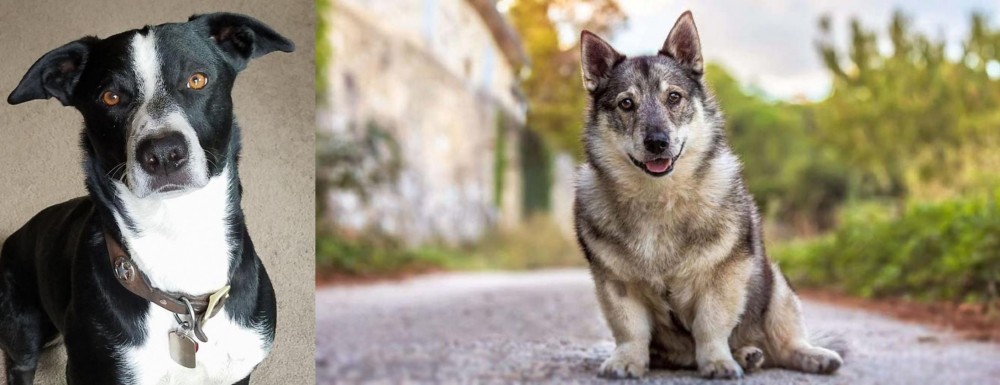 McNab is originated from United States but Swedish Vallhund is originated from Sweden. McNab may grow 30 cm / 12 inches higher than Swedish Vallhund. McNab may weigh 16 kg / 36 pounds more than Swedish Vallhund. Both McNab and Swedish Vallhund has same life span. McNab may have less litter size than Swedish Vallhund. McNab requires Low Maintenance. But Swedish Vallhund requires Moderate Maintenance
McNab is originated from United States but Swedish Vallhund is originated from Sweden. McNab may grow 30 cm / 12 inches higher than Swedish Vallhund. McNab may weigh 16 kg / 36 pounds more than Swedish Vallhund. Both McNab and Swedish Vallhund has same life span. McNab may have less litter size than Swedish Vallhund. McNab requires Low Maintenance. But Swedish Vallhund requires Moderate Maintenance
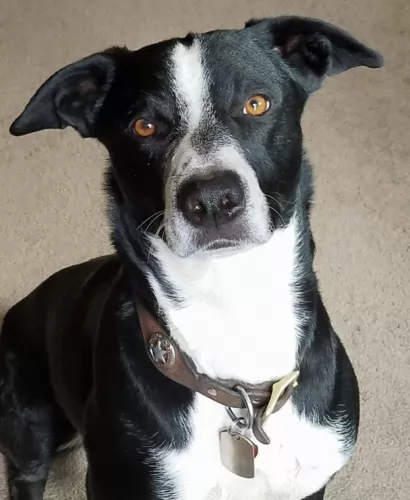 The attractive McNab dog is also known as the McNab Shepherd or McNab Collie. This very lively dog originated in the Mendocino region of Northern California, being specifically bred to withstand tough weather conditions and rough terrain.
The attractive McNab dog is also known as the McNab Shepherd or McNab Collie. This very lively dog originated in the Mendocino region of Northern California, being specifically bred to withstand tough weather conditions and rough terrain.
The dog is becoming popular outside of California now. A Scottish rancher with the surname McNab left Scotland and arrived in California in the 19th century. He crossed Scottish Border Collies with Shepherd dogs and the ranchers in California started using these dogs for herding livestock.
Today they are still being used as herding dogs in California and other countries. The dog isn’t recognized by the American Kennel Club. It was in 2014 that a group of McNab Shepherd breeders established the McNab Shepherd Registry so as to work towards the advancement of the McNab Shepherd.
 Known also as the Västgötaspets or Swedish cow dog, the Valhund hails from Sweden. It’s a herding dog, and was always a farm dog in that country.
Known also as the Västgötaspets or Swedish cow dog, the Valhund hails from Sweden. It’s a herding dog, and was always a farm dog in that country.
It was in 1943 that the dog was first recognized as a breed by the Swedish Kennel Club. Only later, in 1996, did the American Kennel Club start registering the breed.
 The McNab Dog is a medium-sized working dog. The appearance of this dog varies quite a bit. For instance you may come across a dog with erect ears or floppy ears or a long tail or one that is naturally bobbed.
The McNab Dog is a medium-sized working dog. The appearance of this dog varies quite a bit. For instance you may come across a dog with erect ears or floppy ears or a long tail or one that is naturally bobbed.
When it comes to size, you will find that between the males and females they stand at roughly 40 – 64cm and weigh anything from 14 – 30kg.
Most of these McNabs are black or red with white feet, white tipped tails and white markings around the face. The coat is weather resistant and fairly short and dense. You also get tri-colored McNabs. Eyes are usually a brown or copper color though you might find some with bluish eyes as well.
These are such intelligent dogs so with training and socialization you’ll find he is able to learn easily and quickly. He is a self assured dog, so he will respond well to an owner who is firm and fair, patient, kind and consistent.
He is best suited to life in the country as he needs lots of place to run around. If you don’t live on a farm, take the dog for long walks every day as he requires lots of exercise and mental stimulation. He is a loving family member too, getting along well with kids in the home as well as other pets. He is also a good guard- and watch dog, taking his job as protector of his human family very seriously.
 Looking much like a cross between a Corgi and the German Shepherd, the Swedish Valhund is a medium sized dog that stands between 30 and 34cm in height and weighs between 9 and 14kg.
Looking much like a cross between a Corgi and the German Shepherd, the Swedish Valhund is a medium sized dog that stands between 30 and 34cm in height and weighs between 9 and 14kg.
His medium length weather-resistant coat is available in wolf like shades – cream, grey, brown etc. The tail can be long or bobbed and the medium sized ears are held erect.
Intelligent, confident, independent, alert, playful and active, your Swedish Valhund promises to make a good family pet.
You'll need to be an active, outdoor type of family though, as he isn’t a couch potato type of dog, snoozing in front of the TV.
He wants to be up and about going on long walks or playing ball games that give him a good run. If he gets his fair share of exercise he can adapt to life in the city or the countryside.
He just loves his human family and wants to be constantly with them. He won’t do well if you just keep him locked outside away from everyone. He is social, alert innovative and entertaining as well as being a good guard dog.
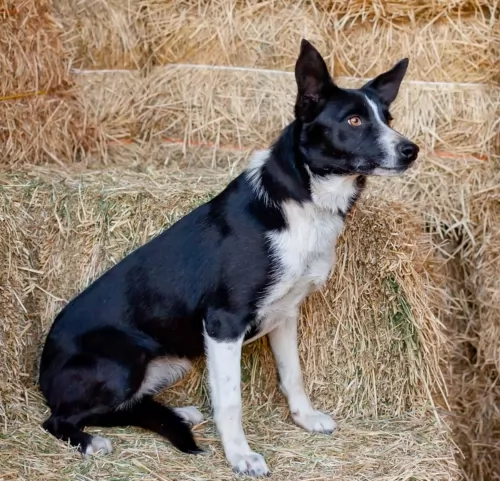 The McNab makes a splendid pet and is known to be even-tempered, being friendly and tolerant with his entire human family.
The McNab makes a splendid pet and is known to be even-tempered, being friendly and tolerant with his entire human family.
He gets on well with children in the home as well as other pets. He has always been a hard working pet and doubles up as being an excellent guard dog too. Those who have had the McNab as a pet say that you couldn’t get a more excellent family canine friend.
 Your Swedish Valhund is such a confident, independent dog and he promises to be a loving, faithful pet. He's also alert and will let you know if strangers are approaching his property.
Your Swedish Valhund is such a confident, independent dog and he promises to be a loving, faithful pet. He's also alert and will let you know if strangers are approaching his property.
He is a calm, easy going pet and is capable of adapting to quiet or noisy homes. He may be quite a strange looking dog, but he's got a whole lot of loving to give.
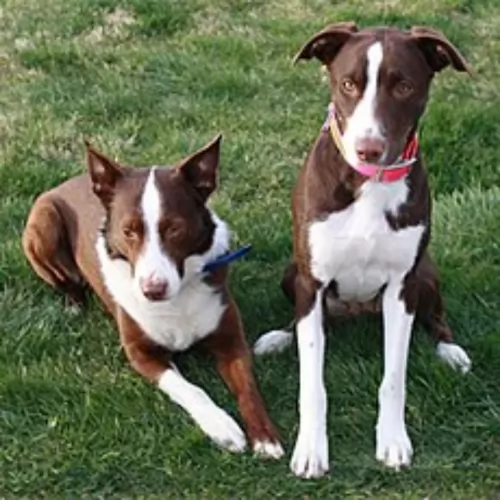 This dog doesn’t really have genetic health issues, but they can suffer with hip dysplasia, a problem that many dogs battle with, whether small or large, young or old.
This dog doesn’t really have genetic health issues, but they can suffer with hip dysplasia, a problem that many dogs battle with, whether small or large, young or old.
They can also suffer with epilepsy and an eye disease such as entropion where the lid of the eye is turned inwards. Check its ears and teeth regularly for infections and keep up to date with his vaccinations.
The McNab is a health dog breed so you aren't likely to face any of these common dog health issues.
 Capable of living a long, healthy life, the Swedish Valhund isn’t likely to fall victim to some of the many dog illnesses there are, and yet it is wise to be alert to some of them that he could get.
Capable of living a long, healthy life, the Swedish Valhund isn’t likely to fall victim to some of the many dog illnesses there are, and yet it is wise to be alert to some of them that he could get.
One of these is an hereditary eye disease known as retinopathy. Its where there is degeneration of the retinal photoreceptor cells. This eye disease can lead to blindness.
You need to be careful with this pet of yours, because with his long back and short legs he can so easily hurt his back if he leaps off a bed or high chair.
Whenever you pick this dog up, always support his legs and back. Don’t pick them up without supporting both the front legs and the rear end.
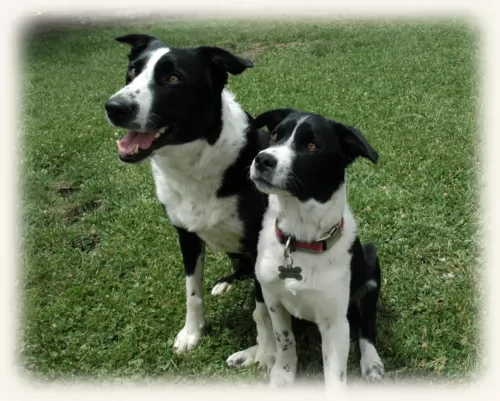 You can feed your McNab dog commercial dry kibble, but then you want to be sure its the best quality one. Buying inferior foods means that you’re getting a whole lot of ingredients in the food that are bad – sugar, salt, preservatives, fillers, colorants etc. Rather go for the best brands that will ensure that your dog is getting all the vitamins and minerals he needs.
You can feed your McNab dog commercial dry kibble, but then you want to be sure its the best quality one. Buying inferior foods means that you’re getting a whole lot of ingredients in the food that are bad – sugar, salt, preservatives, fillers, colorants etc. Rather go for the best brands that will ensure that your dog is getting all the vitamins and minerals he needs.
Homemade food is also important and foods such as boiled chicken, brown rice and pasta as well as cooked or raw vegetables chopped up and added to his dry kibble can make for a delicious, wholesome treat. It will be to his benefit if you can every now and then give him some raw meat as well. Make sure to see that he has a constant supply of fresh, cool water.
McNab Shepherds are very active dogs and they are going to require quite a bit of physical exercise as well as mental stimulation. They are dogs who have been used to herding livestock and he loves this busy life. It is why he wouldn’t be happy living in the city but is better suited to farm life or in a home with a large garden. Long walks and hikes will suit him as well as swimming and joining in every game there is.
The McNab is considered to be a low maintenance dog and grooming the short thick coat will be required twice a week. Always check around the eyes and ears as well as inside the mouth for problems and infections.
 Try and feed your Swedish Valhund two meals a day instead of just one, so that he doesn’t gobble down his food too quickly.
Try and feed your Swedish Valhund two meals a day instead of just one, so that he doesn’t gobble down his food too quickly.
Your dog can be prone to obesity, so you have to be careful with the way you feed him. Overfeeding a dog packs on extra weight and this puts strain on the joints.
Apart from the dry kibble that you feed him, try to include some tasty, nutritious homemade food such as boiled chicken, brown rice or pasta, sweet potatoes, carrots and spinach.
This can all be chopped up and added to his dry kibble. Some raw meat added to the diet can only be to his benefit. Remember to always ensure a bowl of fresh, cool water is available.
Give his thick coat a brush twice a week to remove dead hair. Brushing also stimulates the sebaceous glands that produces oil which gives the coat is sheen.
Trim his nails because left long, they can hook onto things and rip the skin open.
Check inside the ears too for redness which could mean an ear infection.You get dog wipes that you can wipe the ear out with. There are always professional dog groomers who can do these chores for you if you don't want to.
See that his vaccines are up to date and that if he shows signs of illness, you get him to the vet.